“Death is a disease, like any other. And there’s a cure. A cure. And I will find it.” – Tommy Creo (The Fountain)
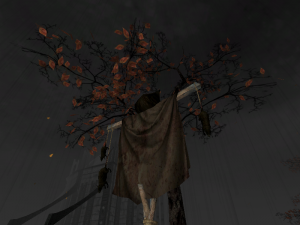
There is a eucalyptus tree in my back garden. It was a bush, but if you coppice it a certain way over a period of years it takes the hint and grows into a tree. Today we have had to cut it again. Not to let it grow, however, but to stifle its existence. For what reason? It causes a shadow to be cast on the neighbour’s garden between the hours of three and six pm. It doesn’t matter that summer is coming to an end, and the sun is barely out, nor does it matter, apparently, that the neighbour is out every day during these hours (more or less). No, to satisfy a fickle human’s desire we’ve got to do something destructive. And that’s what life is largely about – doing something destructive for your own ends, and if possible getting someone else to do it for you (and I mean this with no amount of malice or angst). Nowhere is this more prevalent than in the meat industry. Someone else can rear, slaughter, and process a living creature so that you can enjoy a meal that bares no resemblance to what it once was. I’m not a vegetarian, and so I am a hypocrite – and I live with it. It is against this backdrop of death and hypocrisy that we view Pathologic: a game set in an isolated town in the Russian steppe that houses a huge abattoir, and a disease.
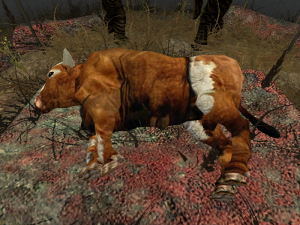
Pathologic is the 2005 game from Ice Pick Lodge, the studio that also gave us The Void last year. I want to share my thoughts on the game with you as I genuinely feel it may be one of the most important games ever released. Not because it’s fun – because it isn’t, not because it accessible or intuitive – because it’s not those things either, and it’s definitely not pretty. It is critically revered in its native Russia (where it won several game of year type awards) for its non-linear narrative, the theatre-like manner in which it plays with the use of avatar and player, and the symbolism in the story of a small town that is infected by a virulent plague which you must attempt to cure. It is a compelling depiction of the species at panic. It implores the player (in the manual even) not to think of it as a “game” but as a “simulator” of a world in crisis due to human destructive influence. Like all good art it holds the mirror to us – and like all good games it lets the mechanics ask all the important questions.
As a sort of disclaimer here I want to note that Pathologic is far from a perfect game. I doubt anyone who is inspired by this post, will play it for more than a couple of confusing hours before coming to the conclusion that I was wrong and that it is merely “an experiment that went wrong” or other words to that effect. The translation from Russian to English is patchy, lyrical and alluring at best, and offensively incomprehensible at worst. In terms of visuals (which should be noted) it has an amazing art-style despite being stifled by graphical limitations (including animations that rightly or wrongly dehumanize the characters more than I would like). However there are many things to be learned from Pathologic, some of which made it into its successor, but some things that didn’t which I’d like to discuss.

Thankfully any "Stuck in a glass box" minigames were dropped.
What is it?
It pays to clarify when discussing Pathologic, so forgive me if you’re already in the know. You, the player, can choose to control one of three “healers” (a doctor studying natural death, a shamanistic surgeon, and a powerful mysterious faith-healer woman who is only available on a repeat play-through) who are all drawn (for different reasons) to the unnamed town that is the setting for Pathologic. Once there a mysterious plague breaks out forcing the town into quarantine, preventing anyone leaving. You, the player, are told at the end of the first day there that there are only eleven days remaining before “the end”. By undertaking quests (limited to each day before they are erased) which often involve preventing the deaths of important figures in the town, you stand a chance at emerging victorious – whatever that means, and discovering the cause of the plague. Where it gets interesting is the non-linear structure of the narrative, the multiple divergent paths they take, and most importantly – the fact that Pathologic’s moral compass seems to be hovering over a pole, and spinning erratically at all times.
The other thing I need to mention is the town. A perpetually foreboding place (be it placid or violently active) with a layout that is no accident. Journeying from one side of the map to the other is a fiddly time consuming walk, treacherous, and tense. The town also features some incredible architecture, optimised in three key buildings. The first is The Polyhedron – an impossible building standing upright on a point, which has been taken over by the town’s many stray children. Then there is The Apiary – a rectangular mental asylum that looks like a Russian apartment block, the kind featured in this movie. It houses the great population of mentally ill inhabitants of the town, who work at the other main building – The Abattoir, a lump on the otherwise flat terrain sticking out like a malignant tumour. Each of these buildings scream of horrors within, and we as players are at once eager to see inside, yet fearful of their looming presence. They stick out like huge sore thumbs to the regular streets, though even these conceal secrets made all the more enticing by your lack of time to explore them.
As I mentioned Ice Pick Lodge want us to think of Pathologic as a simulator – which I think it has the right to do, despite the massive liberties with reality we have to accept. The reality of Pathologic is subjective, it’s about how humanity copes in the event of an epidemic – it’s a sociology simulator. I’ll allow them to explain themselves:
“According to the world statistics quantity of population on the planet comes to 6 bln. It witnesses of an extreme density of population and as a result of natural resources shortage. At critical point there turn on natural mechanism of population limitation. Natural cataclysms and outrages of new, unknown before diseases prove the said above.
Judging from that we think it is necessary to higher up the level of people training in critical situations. Hereby we offer for your attention the simulator of a human being behaviour in the condition of pandemic.
“Pathologic” is the initial game prototype of the simulator. The environment assumes lack of scientific progress and public evolution of the most primitive level; the disease and methods of fight with it are extremely conditional. The simulator is oriented first of all at a mechanism of taking right decisions. The simulator is presented in electronic format.” – (sic)
Have you heard about the idea Warren Spector wants to make? The idea of the “One City Block” in which every flat has a unique character in it with their own motivations, and whatever you do in the affects everyone differently – bringing about the use of consequence in your actions in a totally believable and meaningful manner? The idea was to have unlimited exploration and as little linearity as possible. If you’re reading this you probably have, and I postulate that Pathologic is the closest thing we have to that idea right now.
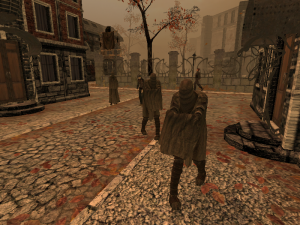
Decisions decisions…
Ice Pick Lodge refer to the game as an exercise in decision making. This is undoubtedly true. These decisions range from mundane things like “What food am I going to buy?” to much more penetrating and difficult decisions, which by their natural occurrence in gameplay are rendered more powerful than any of the “defining moment” decisions you’ll find in any Bioware RPG, Fable, or Bioshock. To best illustrate this I’ll have to give you a few examples.
The town is crawling with children whose parents either don’t give a toss about them, or (more likely) they’re deceased. They have segregated themselves into three gangs, one lives in the Polyhedron, one worships a girl called Kapella, and another wears dog masks on their heads to scare people (and it works). Having children in any game that also features combat is just asking for trouble, but trouble is something Pathologic revels in. If, for some reason, you’re one of the people lamenting the fact you can’t kill children in Fable, and that there plain aren’t any at all in GTA then today is your lucky day – tough guy.
More worrying (to the player taking it seriously) is how the children’s economy works. Talking to a little girl it transpired we could trade. For a narrative reason the children have all decided to play a few games – one is “epidemic” where the children are looking for some powders one of the older children had made a few years ago that had the ability to cure the current plague (made from random pills, completely unrepeatable). This has lead to the children collecting all the medical supplies they can get their grubby hands on, despite not really needing them. They’re also playing a game which involves them collecting nuts. The little girls will accept sewing needles as payment, and the little boys like razor blades. The moral quandary is self-evident, surely. There is no doubt that you need all the medical supplies you can get your hands on, and curing this plague is undoubtedly a just cause, but do the ends justify the means? Can you play upon these children’s naivety (or your condescending judgement of in what they place value) and serve yourself? Do you rationalize that leaving the children with medicine is more dangerous than leaving them with nuts, or even razor blades? There are no easy answers in Pathologic, just many difficult questions. And that’s just trading.

Yeah, I'll have your plague remedy for... these nuts. Run along.
Death is a key theme throughout Pathologic. The player, and whatever character you play as, will confront death at all turns. In my first playthrough I played as Daniel “The Bachelor” Danovskiy, a man with a deep-rooted fear of death. He fears the physical process of his own death, and he fears the figurative death of his identity in the memories of others. This is evident in the very nature of his work (much like Tommy Creo in The Fountain a year later) Daniel is a scientist trying to understand and prevent natural death. His obsession has brought him fame and celebrity, which in turn has validated this obsession however an unnamed “Authority” has shut down his laboratory and put him into a crisis. Figuratively, with his work halted, and his name tarnished he has died a professional death – and is in mortal terror that not only will he be unable to continue his work and hopefully prevent his own death; he will also not be remembered, at least respectfully, by his peers. His reason for coming to the town is to study a man who has lived beyond a natural life span and hopefully complete his research and achieve immortality in both a figurative and literal sense. You are a rational human being, and hopefully can take the reins of The Bachelor in this stead. However your choices aren’t just role-playing.
Everybody you speak to in Pathologic has an angle. Everybody wants something from you, even the first conversation you have in the game (as the Bachelor – the easiest of the three to play as) is filled with double-talk, misdirection, and a flat out lie. You come to the town, to see a man called Simon Kain. In the first conversation with the woman in whose house you are staying she implies that he does not exist and is in fact an abstract concept. That’s already a bit strange, but that’s sort of a well balanced “tutorial lie” (or is it?) to get the player used to the fact that this game isn’t afraid of misdirecting you, making you really ponder why you or your avatar would do any of the tasks asked of him. Your motivation for choosing and completing tasks is being asked of you, not simply whether you can.
I make a point of saying that because in games traditionally that is somewhat optional. People skip cutscenes, people click through dialogue and rush to complete the next objective, seeing only the task at hand as the “content”. It’s why the isolated incidents when games force you to make a choice people flip out about it. In Bioshock do you harvest or save the little sister? Apart from it being a ludically negligible choice (as the game rewards you for doing the right thing, leaving everyone pondering why on earth you’d do the wrong thing) it’s not even a difficult moral choice. It was just a moment where you as a gamer was put at a fork in the road, and people enjoy telling other people which way they went. Pathologic doesn’t have a “little sister” moment because it would never ask something of you as clearly definable as good or bad. Also, in Pathologic these moments occur frequently, and without fanfare – which makes them a core part of the game, not an interface-changing novelty moment. Because of this I would call Pathologic one of the few successful marriages of ludology and narrative.
One of the factors that goes into every choice you make (making them infinitely harder) is your stats. Your Sims-like needs. Hunger, immunity, exhaustion, health, and reputation all play into your choices. The interplay between whether or not you can afford to keep something in case you’ll need it tomorrow (when you don’t know if you’ll make it that long) or sell it today (not knowing what will happen to the black market) and the general anxiety of survival will constantly influence your decisions. This fact is what produces the moment when you realise that you’ve become as hysterical as everyone else in this state of pandemic, and let your morals and humanity slide for the sake of your selfish fears.
The mechanic that provides the most interesting reactions is “reputation”. If it gets too low you will end up lynched by the mob and burned at a stake (you see it happen to other people), and people will not help you accomplish your goals at all. It’s also a reminder that you are a person, and not a questing robot, and it adds pressure to your tasks. This pressure causes you to behave as the character would. When looking through bins to find items (an activity that happens with none of its real world connotations in games usually) you find yourself looking around furtively in case people see you, and you only do it in the poor areas so if you are seen people don’t think much of it. Another example is that due to the hysteria of the plague you learn that nobody cares if you kill any of the muggers that stalk the streets at night so, where once you would have avoided them, you start ambushing them so you can loot their bodies. It works both ways – dictating what you think you can and can’t do.
The reputation mechanic enforces the ideas the characters are constantly giving you with their deceptions. You are only who the world thinks you are. You are not judged by what you think or do, but what people see you do. This is where the theatrical subtext comes into its own. It begins with character selection. Before we can truly begin the avatar experience of Pathologic we must choose who we want to be. To facilitate this, and to introduce us to the key themes of the game, we are treated to the performance of a scene in the town’s theatre starring the three playable characters. This, it should be noted, does not happen in the timeline of the game itself, it is the first evidence of the theme of theatre being the mirror of the soul, of how you behave as an act, and who you appear to be meaning more than who you actually are. The three characters do not know each other in the game, and all three so far have not convened in one place so this conversation is essentially a means for us to understand whom we are choosing through the eyes of the other characters if they did know each other. It shows us this is a game in which opinions must be taken with a pinch of salt, even here, at the very beginning.
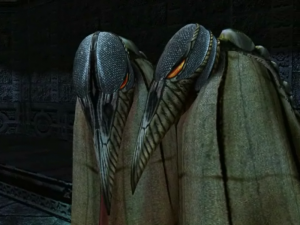
The theatrics spin out from there. You meet the directors – cloaked figures with plague masks on called The Executors. They play no part in the agency of the plot, but to stand ominously outside the houses of the characters you’ve allowed to get sick, barring your entry. They inform you of your role as the actor, of the town as the stage, of the regular NPCs as extras (neatly explaining their appearance), and even how reputation works. Their role as directors is not lost on the developers, craftily using them to dictate the edges of the map without breaking immersion. On the approach to an edge you are not met with the waist-high fence of doom, but with an Executor shaking his head grimly. Then you meet the Tragedian, your understudy. In the plays you see at the theatre every night (the play within the play) he is there, dressed in black wearing his tragedy mask. When you speak to him he tells you of your other needs, reminds you you’re a character, a person. He is clearly a method actor.
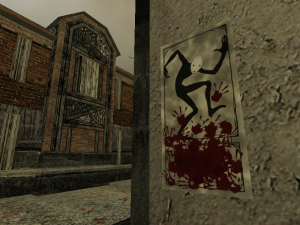
The theatrics don’t stay in the forefront of your mind, but the lessons it teaches you do. You play the role, and let your morals slide. Survival achieved at the cost of identity. Is that survival at all? Yet another decision for you to make. It all builds up to three separate finales which I don’t think is sporting at all to discuss here. I think I’m on the brink of saying too much for now. Let us move on.
What happened next?
Well Ice Pick Lodge are characteristically obtuse on the issue. This quote from their RPS interview is most telling:
“In order for the player’s decision to mean anything these “predictable environments” must be directed — and that’s where the turf for research is nearly unlimited. The main idea to keep in mind is that the player must not feel that the game is “working” with the simulation of a player that came before him, but with himself directly — the guy who is actually sitting in front of the monitor. The hero’s problems should derive from the player’s problems. There are no recipes or laws to follow here — everything depends on the setting, the game’s world and the key goal.”
When I picked that apart for clues I found they shared one of my key philosophies with games. It’s only implicit but in there is slight against genre, that every game should be uniquely built upon its “world and key goal”. The other thing to draw from that is they want to synthesize the emotions of the player and the avatar, it isn’t clear if they want not to drag you into the avatar’s plight (which I confess occurred with Pathologic) or reach a sort of middle-ground. I suspect the latter, as for The Void they more or less removed all identity from the protagonist… but that’s a story for another time (in a few days). But let’s take a quick summary on what went right in Pathologic:
1. The things you did affected other people’s views on you in a way that seemed believable.
2. The things that were asked of you had an interior logic that caused you to ponder genuine moral conundrums as you would in real life faced with similar circumstances.*
3. The art-style and world design created a genuinely uncomfortable atmosphere, which enforces the narrative and ludology without overpowering them.
4. At no time do you feel as though what you are doing is self-consciously ludic. Everything makes sense within the narrative’s logic, and the game’s systems – while hampered by some user-interface issues, reflect the narrative extremely well.
Taking these things into consideration there were a lot of directions Ice Pick Lodge could go in. In the concluding part of this article I’ll be examining what they did do, and piecing together my thoughts on why.
More in the concluding part of this article
Mike Dunbar (Follow me on Twitter at MikeDunbar and for Chronoludic updates click here)
*Perhaps trading razor blades for drugs from children is unrealistic, but the hours you spend deciding whether or not to sell your only gun and its limited ammunition for some food or medicine is something wholly more believable.



2 Comments
Part 2 please!
I have to make some adjustments, should be up Monday evening.
Apparently my neighbour’s selling their house, and that’s why they wanted us to cut that tree back. Hardly neighbourly since we looked after their hamster!
That’s not the adjustment, just saying.